Best
CLASSICAL GUITAR FOR BEGINNERS
-
Overall: Acoustic Classical Guitar with Soft Nylon Strings
-
Best Feature: Nice Gloss Brown Finish with Decorative Pattern
-
TedScore™: 9/10
Best
CLASSICAL GUITAR FOR INTERMEDIATES
-
Overall: Sublime Full Size Classical Guitar With Impeccable Tone
-
Best Feature: Wow Audiences Using Stellar BR-1 Pickup System
-
TedScore™: 9.5/10
Best
CLASSICAL GUITAR FOR PROS
-
Overall: Has A Warm, Lush Sound with Round Bass and Singing Highs
-
Best Feature: Has Some Modern Appointments That Will Enhance Playing Experience
-
TedScore™: 9.8/10
Picking out a classical guitar can feel a bit tricky and puzzling for newbies and their parents. It’s like trying to find the perfect wand; the choices are endless, and the decision crucial! With over ten million guitars sold each year, choosing the right one might turn into an adventure rather than a simple shopping trip. Just imagine strumming that first chord like a breeze, feeling the smooth wood under your fingers as you prepare to dazzle your audience. This journey through the musical market offers endless fun for anyone eager to start playing. Want to know which guitar could become your perfect match? Dive into this world of strings and melodies and discover the secrets that await.
To help you through the stress, confusion and worry, we’ve put together a short guide to buying classical guitars that will take you through everything from what strings to buy, the anatomy of the guitar and even what accessories you should purchase with your new instrument.
First up, before all that, though, you need to know what to look for when buying the guitar itself.
What to look for in a classical guitar
So what should you look for? How can you assess how well a guitar has been made if you’re a newbie?
Simple.
Follow the steps and ask the questions outlined below:
Check the sound of the guitar-based on tonewood and design
Try before you buy is perfect advice to follow here.
Would you buy a car before you’ve given it a test drive? No.
Would you buy a house before you’ve had a viewing? Doubt it.
So why buy a classical guitar, acoustic guitar or any other kind of guitar without first hearing it and feeling what it’s like to play guitar?

As you try the guitar out, pay attention to how comfortable it feels to play guitar.
Pay attention to the sound of the guitar. The sound is greatly affected by the tonewood (the wood used to construct the body of the guitar).
Each solid wood has a subtly different sound. As a beginner, it’s not that important to know all the differences.
Just trust your ear and go with the one you like the sound of best. You may find it helpful to read our ‘11 Classical Guitars For Beginners‘ article.
Value for money and brand reliability
Your budget is your budget, and there’s nothing wrong with sticking to that.
If you get told about a famous brand of guitar that feels good the play and sounds great, but it’s three times your budget, don’t buy it.
However, a shop assistant or good website will be able to advise you on a good brand that serves you as a beginner well.

Often brands like Strong Wind, Yamaha, and 3rd Avenue will have great options available for beginners and more advanced players, so make sure you look at the most famous brands first.
Not only have they been around for years and perfected the art of making instruments for all corners of the market, but they can also afford to sell better acoustic guitars at lower prices.
Recommended classical guitars
When it comes to buy a classical guitars for beginners, three great options to look at are Strong Wind, Yamaha and 3rd Avenue. On top of these guitars, we also recommend all the models in our ‘Best Classical Guitar For Under 1000‘ article.
Classical guitars for beginners
Strong Wind
When you check the price above, you’ll see there are loads of great places to buy this item. Our personal favorite is Gear4music.
It is the largest music retailer in the UK and fast becoming the most respected online music shop in the US too. Their customer service is excellent, they have competitive prices, really fast shipping, and usually have the longest guarantee.
Most professional musicians use Gear4music, so there is no reason why you shouldn’t too!
- Very easy to play
- Affordable
- Not the most unique guitar (if that matters to you)
The professional musician who wrote this article combined many things,
from the product build, manufacturer’s reputation through to feedback
from other users, to create our famous TedScore™.
Strong Wind classical acoustic guitars provide great value for money, coming in at under £/$50. The beginner model listed above also includes a soft case which will be ideal for protecting this guitar from the elements during cold winter school walks.
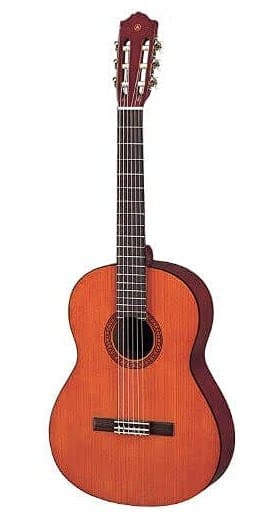
DESIGNED FOR: Beginners
COMES WITH: finger-friendly nylon strings and a smooth ergonomic feel
FEATURES: A perfect size guitar (3/4) for youngsters
Yamaha
When you check the price above, you’ll see there are loads of great places to buy this item. Our personal favorite is Gear4music.
It is the largest music retailer in the UK and fast becoming the most respected online music shop in the US too. Their customer service is excellent, they have competitive prices, really fast shipping, and usually have the longest guarantee.
Most professional musicians use Gear4music, so there is no reason why you shouldn’t too!
- Feels comfortable for beginners
- Affordable
- None
The professional musician who wrote this article combined many things,
from the product build, manufacturer’s reputation through to feedback
from other users, to create our famous TedScore™.
The Yamaha model is a little more expensive, and it doesn’t include a case, but what’s lacking in accessories is made up for in build quality.
Yamaha are known the world over as a leading manufacturer of instruments. They have been making great acoustic guitars for all levels of players for decades now, and this model is no exception.
In terms of the best all-around package deal, though, 3rd Avenue really takes the biscuit here.

DESIGNED FOR: Beginners
COMES WITH: Gig Bag and Everything You need
FEATURES: ¾ good for kids
3rd Avenue
When you check the price above, you’ll see there are loads of great places to buy this item. Our personal favorite is Gear4music.
It is the largest music retailer in the UK and fast becoming the most respected online music shop in the US too. Their customer service is excellent, they have competitive prices, really fast shipping, and usually have the longest guarantee.
Most professional musicians use Gear4music, so there is no reason why you shouldn’t too!
- Very, very cost effective
- At some time you'll want to upgrade
The professional musician who wrote this article combined many things,
from the product build, manufacturer’s reputation through to feedback
from other users, to create our famous TedScore™.
The guitar is good sound quality; it comes with a good case, some picks and a capo, which will be very helpful during the early stages of learning.
Classical guitars for the intermediate player
Things get more interesting for intermediate players with the introduction of the La Mancha Rubi CMX-CER.

DESIGNED FOR: Intermediate Level
COMES WITH: Savarez Cantiga nylon strings
FEATURES: Hook your Audience using BR-1 pickup system
La Mancha Rubi CMX-CER
When you check the price above, you’ll see there are loads of great places to buy this item. Our personal favorite is Gear4music.
It is the largest music retailer in the UK and fast becoming the most respected online music shop in the US too. Their customer service is excellent, they have competitive prices, really fast shipping, and usually have the longest guarantee.
Most professional musicians use Gear4music, so there is no reason why you shouldn’t too!
- Lovely sound
- None.
The professional musician who wrote this article combined many things,
from the product build, manufacturer’s reputation through to feedback
from other users, to create our famous TedScore™.
Next is the Admira Virtuoso Electro Cutaway Thin:
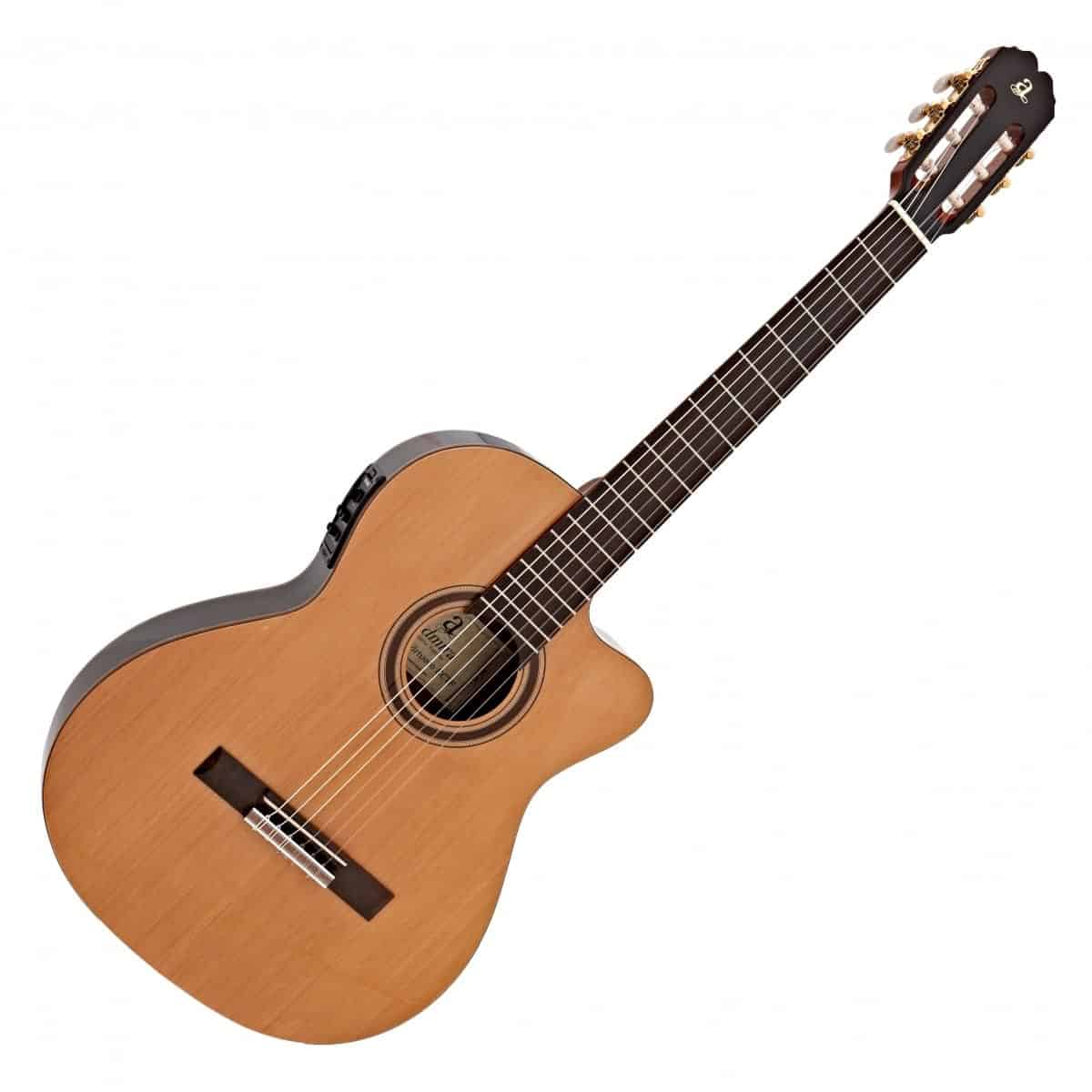
DESIGNED FOR: Intermediate Level
COMES WITH: Slimline Body
FEATURES: Fishman Clasica Blend Pream
Admira Virtuoso Electro Cutaway Thin
When you check the price above, you’ll see there are loads of great places to buy this item. Our personal favorite is Gear4music.
It is the largest music retailer in the UK and fast becoming the most respected online music shop in the US too. Their customer service is excellent, they have competitive prices, really fast shipping, and usually have the longest guarantee.
Most professional musicians use Gear4music, so there is no reason why you shouldn’t too!
- Great touch
- Projects sound well
- More expensive
The professional musician who wrote this article combined many things,
from the product build, manufacturer’s reputation through to feedback
from other users, to create our famous TedScore™.
Just like the La Mancha Rubi CMX-CER, it also has electronics in it, meaning that it can be plugged into an amplifier.
If you want something a little more traditional, then this is a good option.
Classical guitars for the serious classical player
For the most serious classical guitar players out there, like pros and serious students, it’s not best to recommend specific models.
Here’s why.
By this stage in your development, you will have developed a set of unique musical tastes and traits, and this same uniqueness will be reflected in your taste when it comes to buying an instrument.

As such, you’re not looking for a good guitar. You’re looking for a guitar that meets your own unique needs.
How can you know if a guitar meets these needs? Try it first.
So what should you try?
Some great names in the classical guitar luthier world are Duncan Africa, Rafal Turkowiak, Magore and Stoll Guitars.
All of these fine companies believe in making instruments for individuals rather than the mass market and will be keen to get to know what you want and ensure your needs are well and truly met.
PROS AND CONS OF A CLASSICAL GUITAR
- Beautiful Tone
- A great solo instrument
- Also, opportunities to join classical guitar orchestras and make friends
- Often the hardest guitar discipline
- Not much material from popular culture
- Your child may not find it as relatable as acoustic or electric guitar
Classical guitars do not use these techniques...
A classical guitar requires the use of a footstool to be played. This means there’s much more emphasis and tradition surrounding the correct posture and technique. You also seldom play classical guitar stood up with a strap.
I’ve only seen it happen once!
You will also need to grow your nails to play it too.
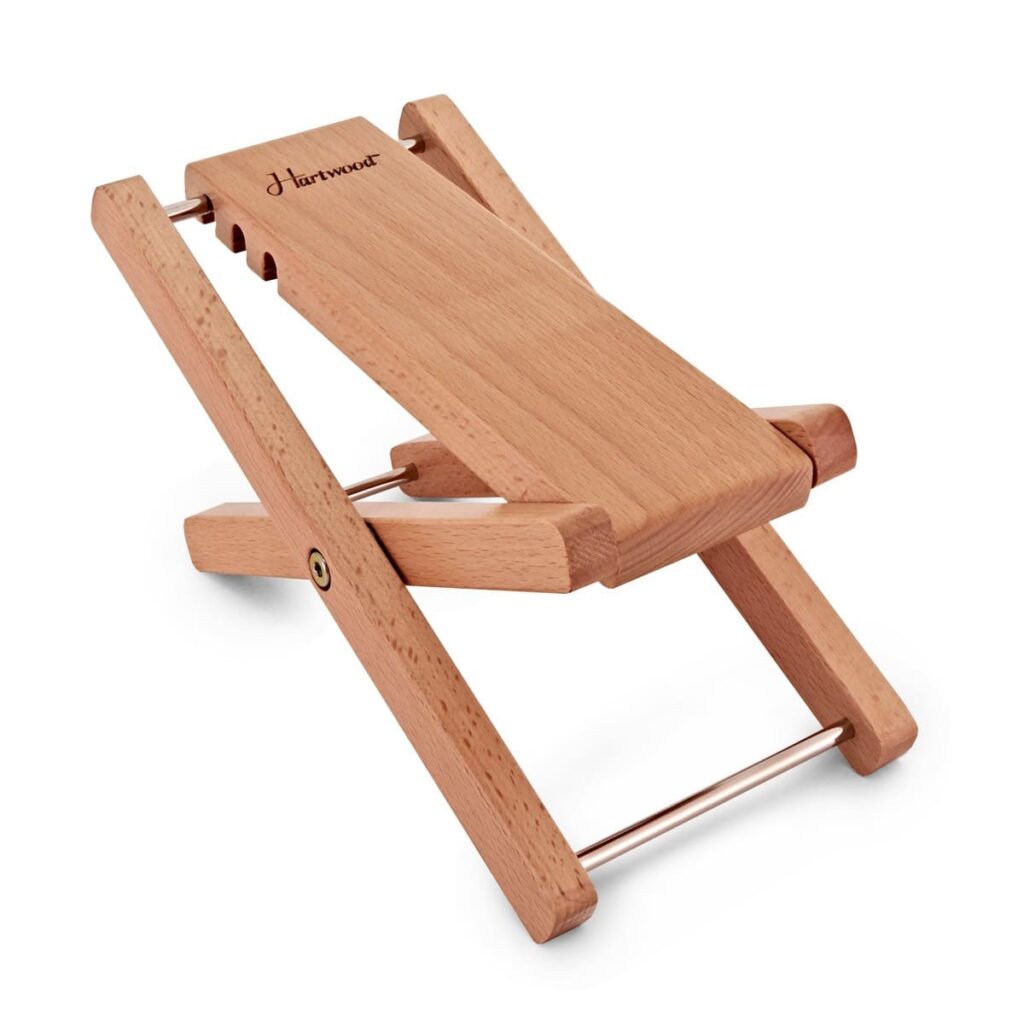
Acoustic guitar, on the other hand, often uses a strap so that the player can play standing.
Many acoustic guitar players do play sat down but again, the posture is different to that of classical guitar.
This different posture, which involves resting the guitar over one of your thighs instead of between your legs, also makes the technique of playing slightly different too.
Finally, the sound of the two is different because each uses additional material to construct the strings.
The steel-string acoustic guitar has much more of an aggressive twang to the sound, which comes from the steel strings themselves.
Classical acoustic guitars, on the other hand, use nylon strings which have a much warmer and mellower tone.
Classical guitar anatomy
Next, let’s turn our attention to the actual anatomy of classical guitars themselves.
It’s all well and good for me to sit here and give you advice about the neck, soundbox or body, but unless you know what those things are, you’ll never fully understand the advice I’m giving you.
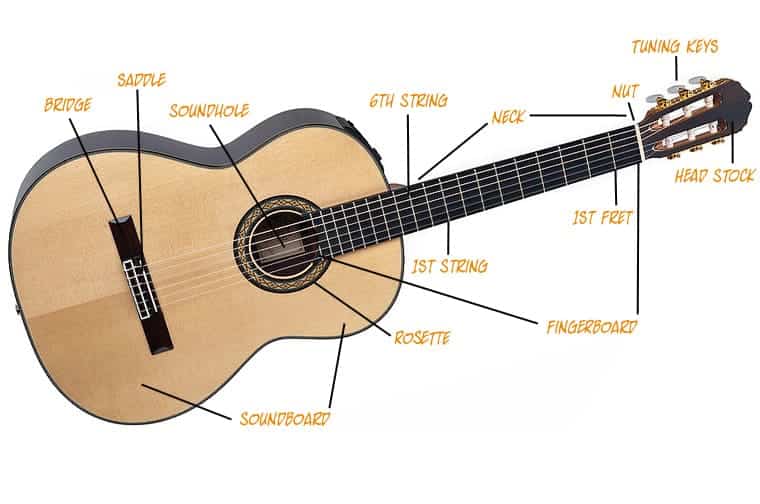
Fretboard
The fretboard is the slab of wood that runs along the surface of the guitar neck. It gets its name from its job on the guitar, which is to house the frets.
The frets are the small metal lines which run vertically down the neck and are used to help create the notes when the guitar strings are pressed against them.
Don’t confuse the fretboard with the neck as a whole, though. The neck is the entire structure that connects the headstock (see below) to the main body of the guitar.
The fretboard is just one component of the neck.
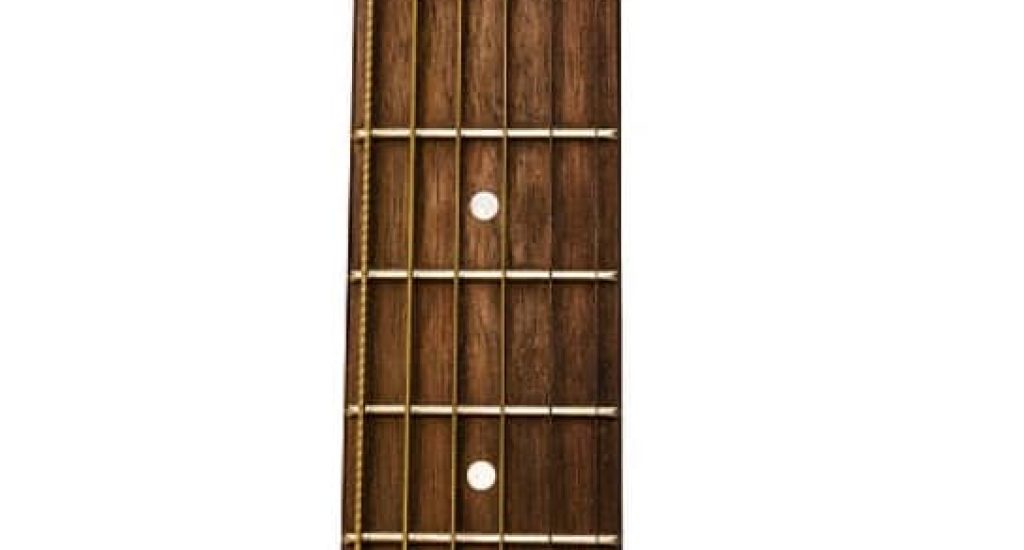
Soundboard
The soundboard is housed inside the main body of the guitar and is a key component of what makes the guitar project itself with strength and clarity.
The soundboard combines with other parts of the guitar to create the soundbox and main body of the guitar.

Nut and Saddle
If you look at the point where the strings rest as they come to the end of the neck and move into the headstock, you’ll see a small piece of plastic that they rest on.
This is the nut.
Its job is the support the strings.

Now look down towards the other end of the strings, and you’ll see a small piece of wood attached to the outer body of the guitar where the strings are also resting.
This is the saddle.
Its job is to attach the strings to the body of the guitar and stabilize them.

Head and Tuning Pegs
The head of the guitar is also another point where the strings are attached to the guitar, but it’s worth noting that they connect here in a different way than to the saddle.
At the head, the strings are attached to tuning pegs which are small fork-like objects that have the strings wrapped around them.
By turning these tuning pegs, you can tighten or loosen the strings, which will help affect the pitch of each string as you tune it.

Tonewoods
Finally, the tonewood of a guitar refers to the wood that it has been built from.
There are many different kinds of wood to choose from, and each will have a subtly different sound from the next.
Cedar top has been the most traditional choice for classical or Spanish guitars for a long time, but it’s also being used very commonly in the production of steel-string acoustic guitars too.

Spruce is an excellent all-around option which suits many different styles of classical guitar playing.
Maple and mahogany tops are found, but most commonly, they are used for the back and sides of the guitar rather than the top itself.
What strings do I need?
Can you put steel strings on a classical guitar? Nope. A classical guitar needs to have nylon strings. A nylon string is what gives the classical guitar its warm yet smooth tone. Take a look at our ‘Best Classical Guitar Strings‘ article.
A nylon string is also the easiest and softest string on your fingers, and since the classical guitar is a style of classical guitar playing that requires you to play guitar with your fingers, nylon strings are the only way to go when buying a classical guitar.
Guitar Size
The size of the classical guitar you buy will depend very much on who you are buying it for.
For younger or smaller children, it may be best to go with a three-quarter sized model.
These have smaller bodies which are better suited to the tiny hands and limbs of children. They will also be much easier for the child to reach around because they are simply smaller in size.
However, if you suspect your child is due a growth spurt, then it may be best to get a full-sized classical guitar so that they grow into it.
A full sized model is also best for adults.
Guitars for children
There are plenty of classical guitars on the market designed for children. Since entry-level classical guitars are becoming a larger market sector, many makers have taken the production of entry-level classical or Spanish acoustic guitars with an increasing level of seriousness.
So how are these entry-level classical guitars unique from the kind of Spanish guitar that might be purchased by an intermediate or advanced player?
First of all, they tend to be much smaller.
Often they are three-quarter sized models meaning that the overall scale of the guitar is smaller.

This makes them much easier and more well suited to a smaller person and smaller limbs.
These guitars also tend to be built out of much cheaper and purposefully durable materials.
As much as we all love our kids, we also know that accidents happen.
So when they do, isn’t it better if the guitar is built with those accidents in mind?
It’s far better to have a dent in something that costs less and is easy to replace if need be than some priceless old antique of an instrument!
How to care for your classical guitar
The first step to caring for your classical guitar is to ensure that it is well protected. This means getting a good case.
You can get either a soft case or a hard case.
A soft case that will be easier to transport but offers less protection.
These are almost like guitar backpacks. They have straps so they can be worn like backpacks and often have plenty of pockets and extra storage so you can comfortably transport your guitar around and spare strings, tuners, sheet music and any other important accessories.

DESIGNED FOR: Classical Guitars
COMES WITH: carrying handle and shoulder straps
FEATURES: Portable design Exterior bottom rubber guard protects your guitar from everyday knocks and bumps
RockBag Classical Gig Bag
When you check the price above, you’ll see there are loads of great places to buy this item. Our personal favorite is Gear4music.
It is the largest music retailer in the UK and fast becoming the most respected online music shop in the US too. Their customer service is excellent, they have competitive prices, really fast shipping, and usually have the longest guarantee.
Most professional musicians use Gear4music, so there is no reason why you shouldn’t too!
- Affordable
- Offers less protection than a hard case
The professional musician who wrote this article combined many things,
from the product build, manufacturer’s reputation through to feedback
from other users, to create our famous TedScore™.
The second option is to go for a hard case that will help keep your instrument safe and protected from wear and tear but are far less convenient to carry around with you.
A hard case can’t be worn like a backpack, and often storage is compromised to gain greater protection.

DESIGNED FOR: Classical Guitars
COMES WITH: ergonomic carrying handle
FEATURES: manufactured into order to provide exceptional protection
Gator GW-CLASSIC
When you check the price above, you’ll see there are loads of great places to buy this item. Our personal favorite is Gear4music.
It is the largest music retailer in the UK and fast becoming the most respected online music shop in the US too. Their customer service is excellent, they have competitive prices, really fast shipping, and usually have the longest guarantee.
Most professional musicians use Gear4music, so there is no reason why you shouldn’t too!
- Classical Design
- Less portable than a soft case
The professional musician who wrote this article combined many things,
from the product build, manufacturer’s reputation through to feedback
from other users, to create our famous TedScore™.
Once you’re sorted with a case, make sure you use a simple, clean cloth to wipe down your guitar before and after you use it every time.
This will stop the build-up of dirt, grime and grease and ensure that the wood stays in good condition and that the strings last as long as possible.
The second option is to go for a hard case that will help keep your instrument safe and protected from wear and tear but are far less convenient to carry around with you.
A hard case can’t be worn like a backpack, and often storage is compromised to gain greater protection.
Technical and set-up issues
This is where things get tricky. A set-up refers to items like adjusting the height of the strings (known as the “action” of a guitar), how the bridge holds the strings or the relief in the neck.
For many beginners, this is a very complex area and is something you shouldn’t attempt to do a set-up if you don’t know-how.
The best thing to do is take the guitar to your local shop and ask for a set-up. It’s very cheap, and a good set-up can last for months and months. Perhaps even years, depending on how often you play guitar.

Accessories for your guitar
Whilst the guitars themselves are important, no guide to buying a classical guitar would be complete without a list of accessories that classical guitar players need.
Many beginner packs include these accessories (another reason why they are such a good deal!), but if you do want to buy them separately, then you should purchase the following.
A Tuner
This will make tuning quick and easy. This clip-on tuner is ideal for either acoustic or electric acoustic.
Often beginners haven’t yet developed the skills they need to tune by ear. Having an electronic device to tune for you is perfect for new players.

DESIGNED WITH: A high sensitivity piezo sensor for blazing fast & accurate tuning
COMES WITH: Brilliant full-color display
FEATURES: Multi-point screen adjustability for the best viewing angle
KLIQ UberTuner
When you check the price above, you’ll see there are loads of great places to buy this item. Our personal favorite is Gear4music.
It is the largest music retailer in the UK and fast becoming the most respected online music shop in the US too. Their customer service is excellent, they have competitive prices, really fast shipping, and usually have the longest guarantee.
Most professional musicians use Gear4music, so there is no reason why you shouldn’t too!
- Ergonomic shape and easy to attach
- Small & Compact
- Stylish design
- None!
The professional musician who wrote this article combined many things,
from the product build, manufacturer’s reputation through to feedback
from other users, to create our famous TedScore™.
Case
As was mentioned above, a case is a must.
The two types of cases available to you are a soft case and a hard case. See the links above for some cases that we recommend.
Also, try to think about which type of case would best suit you or the person you are buying for.
Whilst a hard case provides great protection, it can make for a difficult walk to school.

Likewise, a soft case is far easier to carry around, but it won’t fare so well in the hold of the school bus five days a week!
Music Stand
You’ll need a place to put your sheet music when you play guitar(and no, balanced across your knee is never a good idea).
A music stand is a must-have for any student.
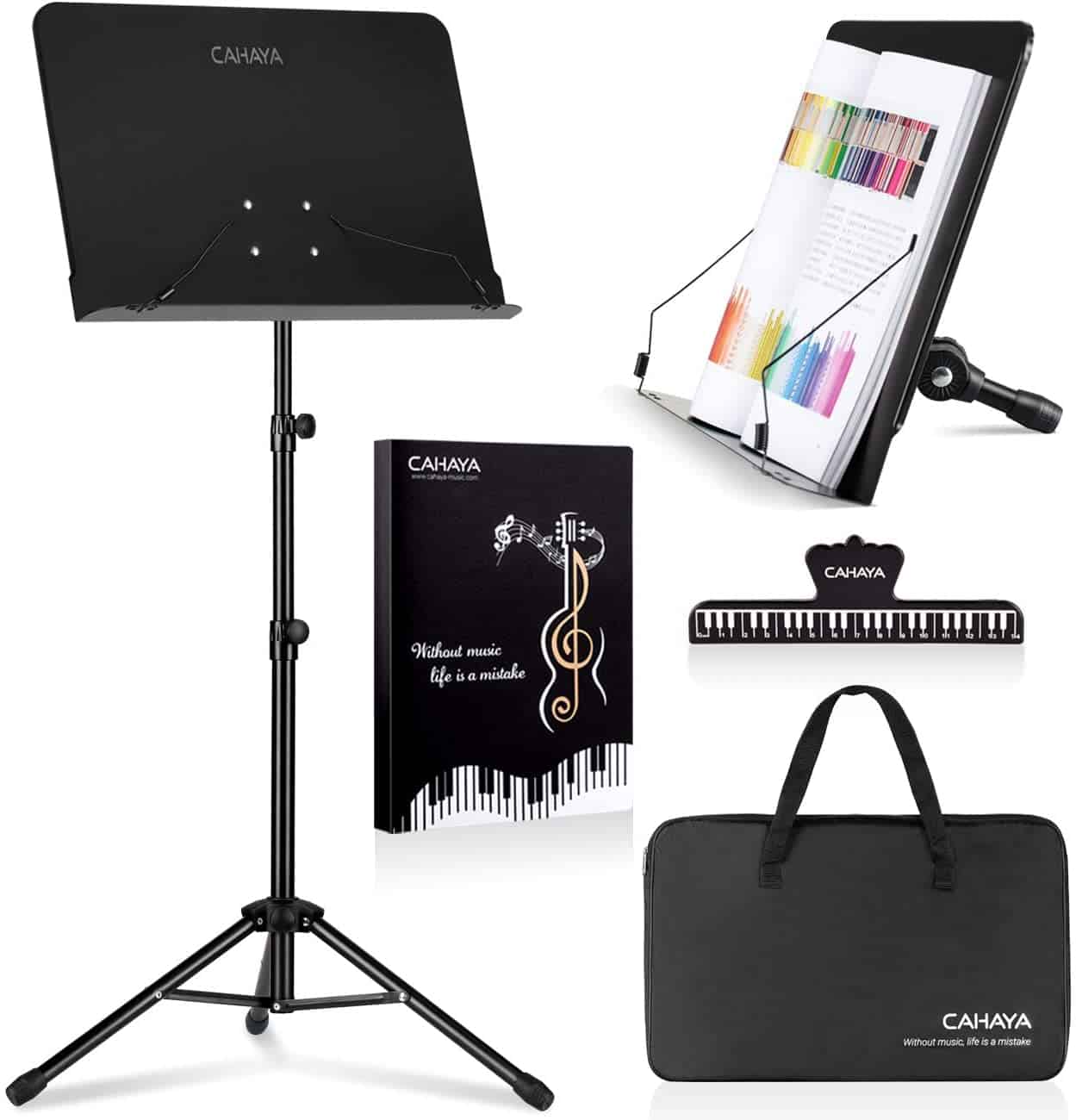
BEST FEATURE: Seriously well-made & sturdy
INCLUDES: Light | Carry Case | Sheet Music Clip
FEATURES: A carrying bag and a sheet music folder
Cahaya Portable Music Stand
When you check the price above, you’ll see there are loads of great places to buy this item. Our personal favorite is Gear4music.
It is the largest music retailer in the UK and fast becoming the most respected online music shop in the US too. Their customer service is excellent, they have competitive prices, really fast shipping, and usually have the longest guarantee.
Most professional musicians use Gear4music, so there is no reason why you shouldn’t too!
- Amazing complete kit
- Has everything you need
- Strong, yet transportable
- None!
The professional musician who wrote this article combined many things,
from the product build, manufacturer’s reputation through to feedback
from other users, to create our famous TedScore™.
Neck Strap
A strap for classical guitar is much less common, but you do see some models with them. It’s very much a feature that has been borrowed from the acoustic guitar and electric guitar.
This could be a worthwhile investment if you prefer to play standing.

BEST FEATURE: All Levels
INCLUDES: Soft Strap
FEATURES: Wide design for comfort
Strap
When you check the price above, you’ll see there are loads of great places to buy this item. Our personal favorite is Gear4music.
It is the largest music retailer in the UK and fast becoming the most respected online music shop in the US too. Their customer service is excellent, they have competitive prices, really fast shipping, and usually have the longest guarantee.
Most professional musicians use Gear4music, so there is no reason why you shouldn’t too!
- An essential piece of equipment
- Good quality
- Small and easy to forget
The professional musician who wrote this article combined many things,
from the product build, manufacturer’s reputation through to feedback
from other users, to create our famous TedScore™.
Foot Stool
For classical guitarists, a footstool is a must. This will help you (or your child) keep a good posture when they play guitar.
And a good posture means better technique, less playing fatigue and ultimately, more minor playing injuries.
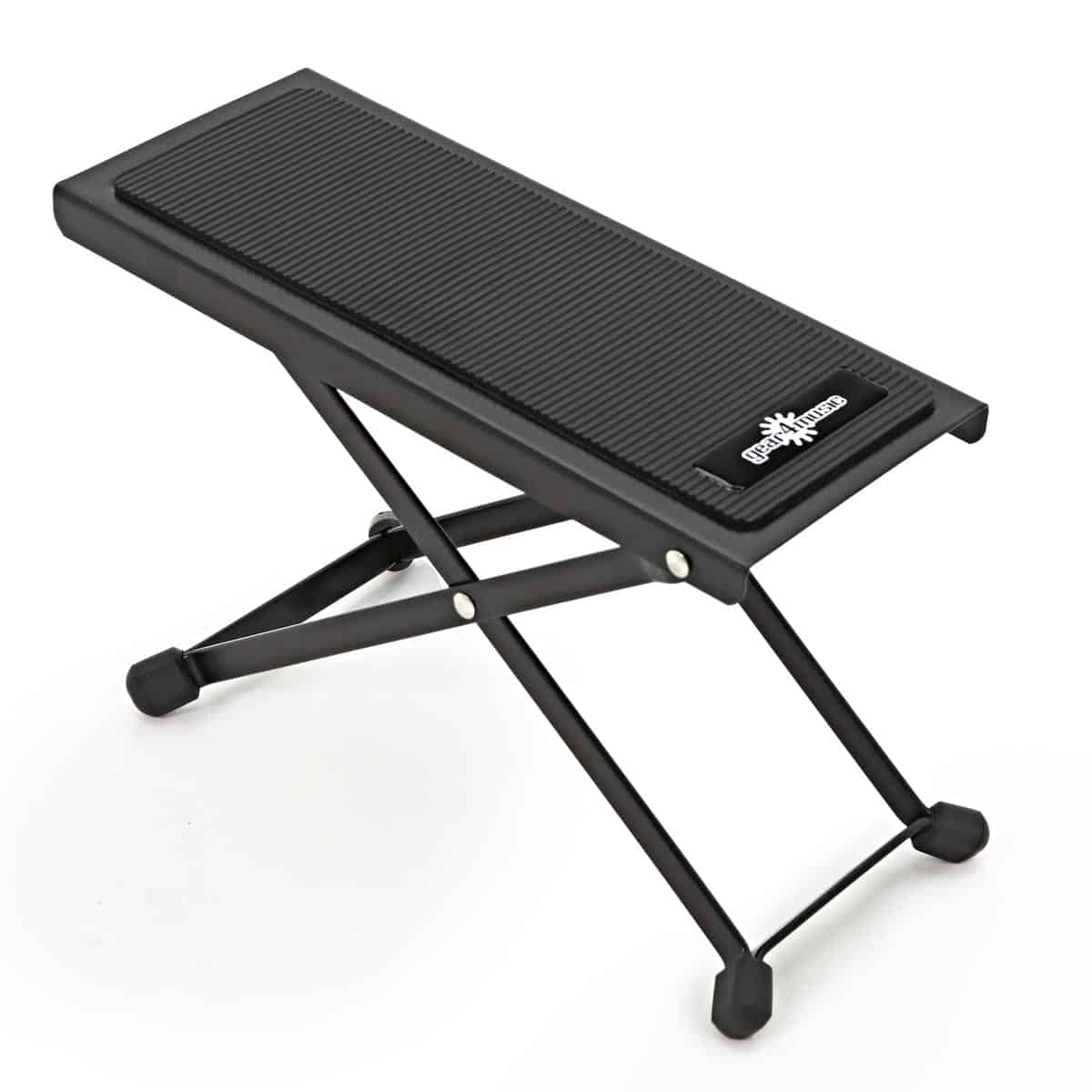
BEST FEATURE: All Levels
INCLUDES: Adjustable Stand
FEATURES: Adjustable height
Foot Stool
When you check the price above, you’ll see there are loads of great places to buy this item. Our personal favorite is Gear4music.
It is the largest music retailer in the UK and fast becoming the most respected online music shop in the US too. Their customer service is excellent, they have competitive prices, really fast shipping, and usually have the longest guarantee.
Most professional musicians use Gear4music, so there is no reason why you shouldn’t too!
- An essential piece of equipment
- May feel awkward at first
The professional musician who wrote this article combined many things,
from the product build, manufacturer’s reputation through to feedback
from other users, to create our famous TedScore™.
Buying A Classical Guitar
Summary
We’ve covered a lot of ground. We’ve looked at all sorts of different acoustic guitars, from entry-level to mid-range in price. And from mid-range to custom made instruments for serious pros.
No matter what you are buying, though, the key thing to take away when you purchase a new classical guitar is to get something that suits your unique needs.
Good luck with your search.
FAQ's
What is the best way to buy a classical guitar?
The best deals for musical instruments are usually online. An online purchase from a retailer like Amazon or Gear4Music will be perfect for most beginners and intermediates. However, if you’re a pro, then don’t buy online.
You’re likely to want to spend thousands, so always try first before buying.
This depends totally on the player. What’s good for a beginner isn’t good for an intermediate and what’s suitable for an intermediate isn’t good for a pro.
To think about it as being more accessible or more difficult is to miss the point. It’s just different from an acoustic or electric guitar.
It has its own quirks, which make it unique rather than harder.
And the fact that it’s different from its two guitar cousins (so to speak) means that you can’t really make a direct comparison.
All you can do is try it out and see if you enjoy it.
Good brands include Yamaha, Freshman and Anygig, but again, this will depend on what level of instrument you want to buy.
The main differences are that a classical guitar is a nylon-string instrument, whereas a normal acoustic guitar uses steel strings.
The posture and technique are also different, and this is detailed in the article above.
A classical guitar (also called the nylon string guitar) is a member of the guitar family of instruments which, as the name suggests, is often used in classical music.
For more information about the classical guitar, its history and origins, take a look at this great article.
The main differences are the strings and the musical application of the instrument as a whole. The steel strings of an acoustic guitar create a more nasal, twangy tone, whereas the nylon strings of a classical create a much warmer, mellower tone



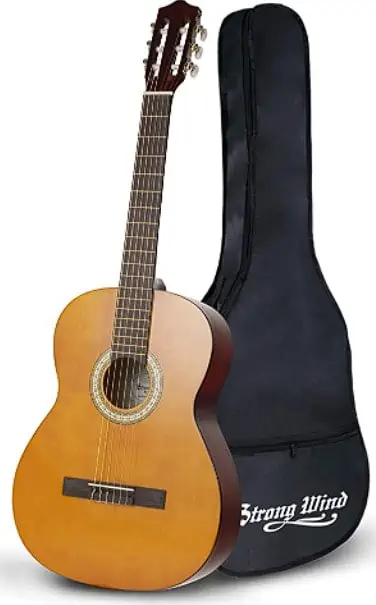

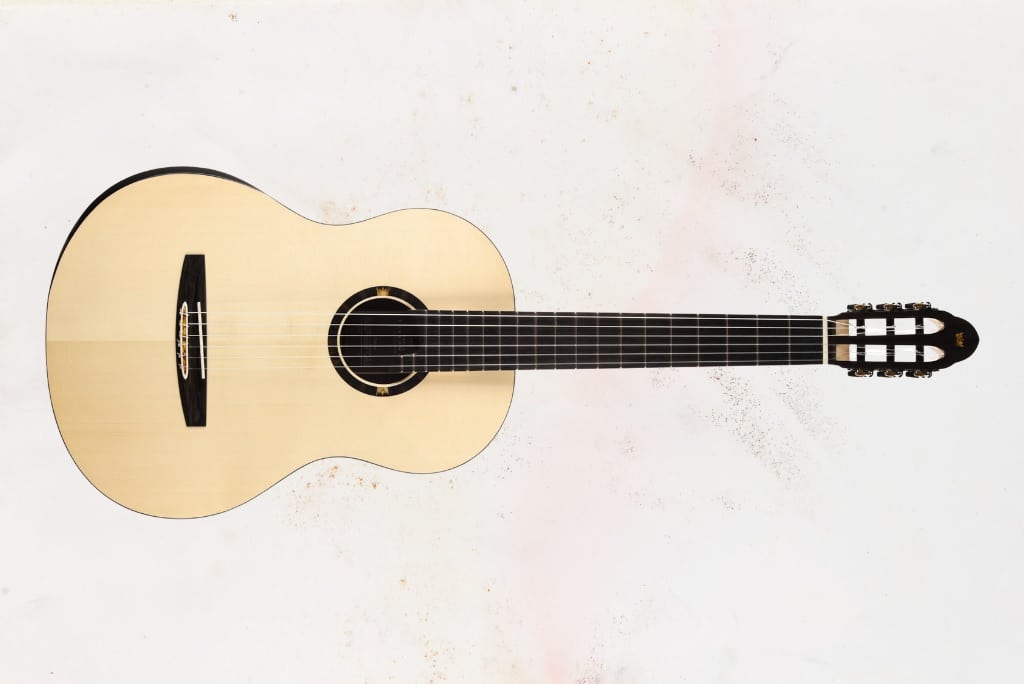
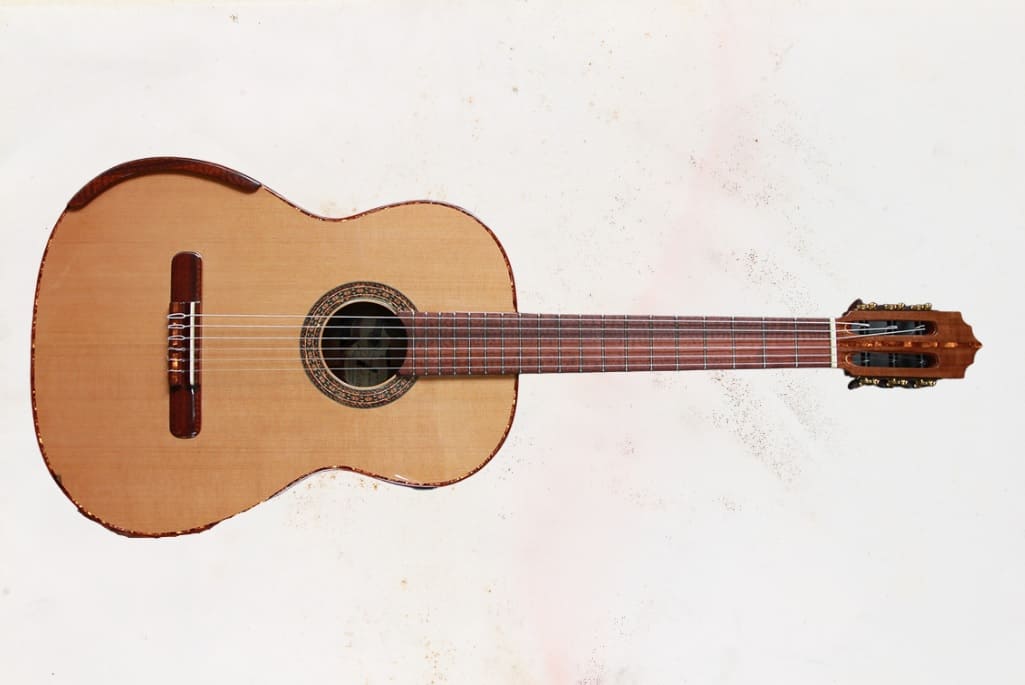
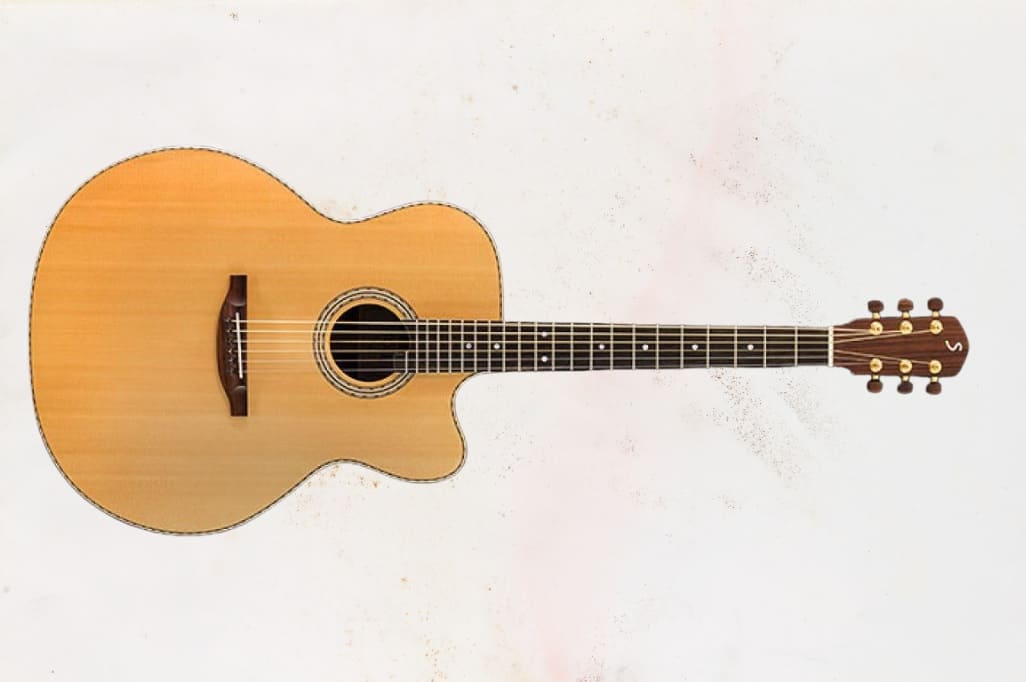
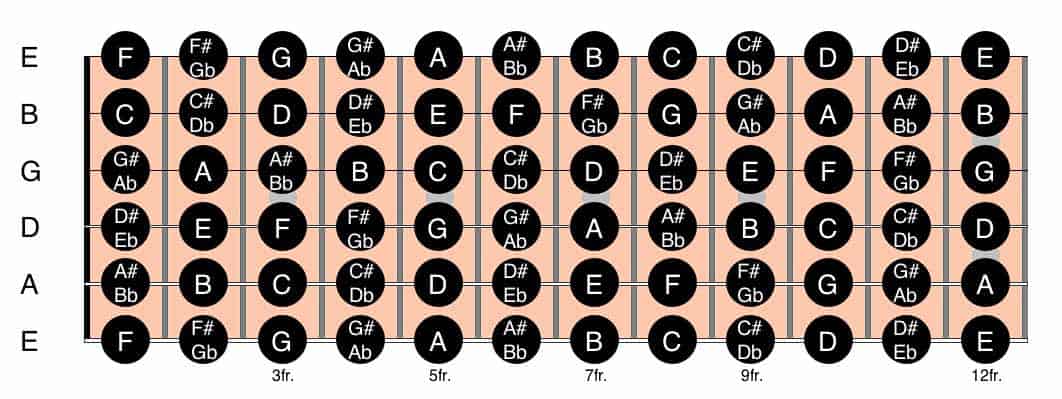
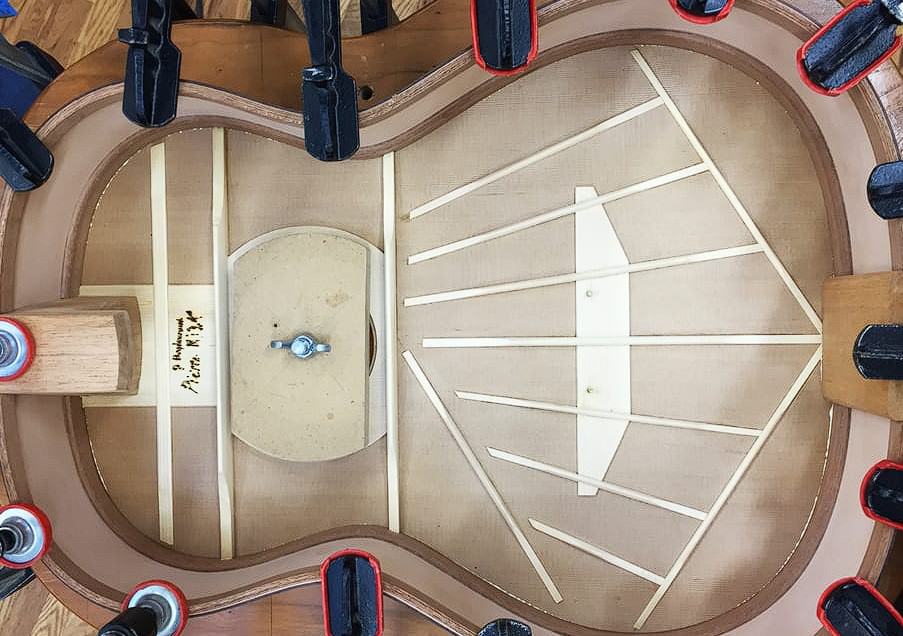









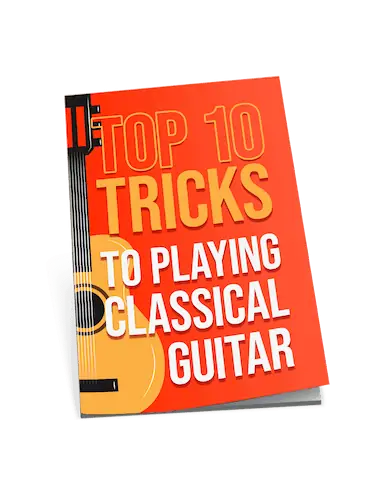
So, if I get a classical guitar, does it come with a time machine? Asking for a friend. 😄
Only if you play it backwards, PixiePlectrum!
Guess I’ll start practicing my backward scales then! 😄
I found the section on guitar anatomy exceptionally well-structured, Hugh Richardson. However, I believe there was a slight oversight in the description of the soundboard’s influence on sound projection and tonal quality. It may be beneficial for readers to understand that the soundboard, combined with the guitar’s bracing pattern, play a pivotal role in the instrument’s voice. Further elaboration on this topic might provide a more comprehensive understanding for aspiring guitarists.
Hey, does the tonewood really make that much of a difference on the sound for classical guitars? I’ve heard mixed opinions and was curious after reading the article. Anyone experimented with different types?
Absolutely, GuitarDude2000! Tonewood affects the resonance and tone clarity a lot. Especially for classical music, where nuance is everything.
Loved the section on classical guitars for beginners, Hugh Richardson! It’s nice to see recommendations that are approachable and not too pricey. Gonna check some of these out. Thanks!